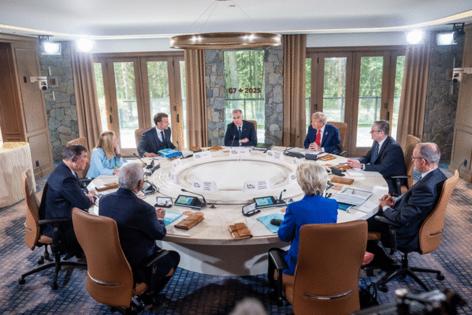Trump urges Iran to make deal 'before it's too late' in conflict with Israel
Published in News & Features
President Donald Trump on Monday kicked off the G7 summit in Canada by saying that he had given Iranian leaders 60 days to cut a deal over their nuclear program before Israel launched its ongoing military assault on the country.
The U.S. commander in chief again urged the Islamic republic to reach an agreement “before it’s too late.” Trump’s comments during the gathering of world leaders came shortly before Israel’s ambassador to the U.S. laid out what it would take from Tehran for his government to end its strikes on what he dubbed “the head of the snake.”
After a meeting in Kananaskis, Alberta, with Canadian Prime Minister Mark Carney, Trump was asked what he and his administration have been hearing from Iranian leaders since Israel launched its strikes last week.
“They’d like to talk, but they should’ve done that before. … They had 60 days,” the U.S. president said of his administration’s negotiations with Iran. “On the 61st day, I said, ‘We don’t have a deal.’”
“They have to make a deal, and it’s painful for both parties, but I’d say Iran is not winning this war,” Trump added, “and they should talk immediately, before it’s too late.”
The U.S. supplies Israel with billions in combat hardware each year. As he left the White House for Canada on Sunday evening, Trump said he would continue resupplying the Jewish state during the hostilities with Iran.
But asked if he might order the American military to get directly involved in the conflict on Israel’s behalf, Trump on Monday replied: “I don’t want to talk about that.”
As Trump and other G7 leaders dismissed members of the media and began a closed-door summit session, Israel’s top diplomat in Washington, Yechiel Leiter, called the matter of whether a change of leadership was needed in Iran “a great question.”
“But it’s not one really for me and my country to answer, the people of Iran have to choose their regime,” Leiter told Fox News, making clear his government would need some major concessions from Iranian officials before standing down.
“If they want a ceasefire, all they have to do is say they are going to terminate their intention of destroying Israel. They’re going to take apart their weapons program,” he said. “They’re going to stop the ballistic missiles program. They’re going to stop firing missiles into our civilian population centers, and they’re going to become a normal state actor, not a bad actor.”
But he also suggested that strikes on Iran, Israel’s longtime top enemy, was the natural next step in his nation’s military offensive following Hamas’ deadly Oct. 7, 2023, attack on civilians inside Israel.
“This began really on Oct. 7, when the proxies attacked our citizens. They slaughtered 1,200 of our people in one day,” Leiter said. “This was all instigated, funded and trained by Iran. It continued for a year and a half, Hamas, Hezbollah, the Houthis — and now we’re at the head of the snake.”
Meanwhile, the White House confirmed Monday that Trump had vetoed an Israeli plan to target Iranian Supreme Leader Ayatollah Ali Khamenei.
Israeli President Isaac Herzog said Monday in an interview with CNN that his country had shared its strike plans with the Trump administration. He sidestepped a question about the Khamenei assassination plan but said Iran’s spiritual leader and highest authority had built “the worst terror infrastructure, I would say a satanic terror infrastructure, (that) has spread all over the world, with a clear intention.”
Herzog also made clear that Iranian leaders wanted to influence the goings-on at the G7 summit.
“What we are doing is contributing substantially to the defense and security interests of all Western and free-world countries and leaders of whom are convening this morning in Alberta, Canada,” Herzog said. “And that is why what we are doing is supporting the security interests of these nations. And we should all align together and be very firm with Israel on this.”
Israeli officials have contended that their government has been striking targets related to Iran’s nuclear program and its senior military leadership — but photographs and video from inside the Iranian capital have shown heavy damage in some residential areas, in addition to smoke billowing from areas where analysts have said work on its nuclear program has been conducted.
At least 224 people have been killed in Iran by the Israeli strikes, according to news reports relying on figures provided by the Iranian health ministry.
In the past two days, Israel has already taken out roughly one-third of Iran’s capability to launch ballistic missiles, a spokeswoman for the Israel Defense Forces told reporters Monday in an online briefing organized by the American Middle East Press Association. The Israeli death toll of nearly roughly two dozen killed by Iran’s retaliatory strikes was a “heavy price, but this just amplifies our goal of this mission,” IDF spokeswoman Masha Michelson said.
_____
(Rachel Oswald contributed to this report.)
_____
©2025 CQ-Roll Call, Inc., All Rights Reserved. Visit cqrollcall.com. Distributed by Tribune Content Agency, LLC.







Comments